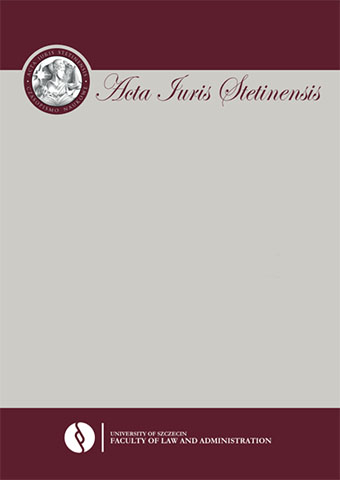







| Autorzy: |
Bogna
Baczyńska

Wydział Prawa i Administracji Uniwersytetu Szczecińskiego |
| Słowa kluczowe: | preliminary procedure Court of Justice principle of unity Supreme Court National Council of the Judiciary |
| Data publikacji całości: | 2019 |
| Liczba stron: | 21 (23-43) |
| Liczba pobrań ?: | 447 |
| 1. | Banaszak, B., Konstytucja Rzeczpospolitej Polskiej. Komentarz, Warszawa 2012. |
| 2. | Barcz, J., Wyrozumska A., Górka M., Instytucje i Prawo Unii Europejskiej, Warszawa 2017. |
| 3. | Chruściak, R., Osiatyński, W., Tworzenie konstytucji w Polsce w latach 1989–1997, Warszawa 2001. |
| 4. | Emmert, F., Morawiecki, M., Prawo europejskie, Warszawa 1999. |
| 5. | Florczak, A., Bolechow, B. (ed.), Prawa i wolności I i II generacji, Toruń 2006. |
| 6. | Kamiński, I. C., Wymiar sprawiedliwości we Wspólnocie Europejskiej. Praktyczny komentarz i przepisy, Warszawa 2004. |
| 7. | Kenig-Witkowska, M.M., Łazowski, A., Ostrihansky, R. (eds.), Prawo instytucjonalne Unii Europejskiej, Warszawa 2019. |
| 8. | Kocewicz, T. T., in: Brodecki Z. (ed.), Europa sędziów, Warszawa 2007. |
| 9. | Kubryk, K., Postępowanie w sprawach wydawania orzeczeń wstępnych w świetle przyszłego rozszerzenia Unii Europejskiej, in: Mik, C. (ed.), Wymiar Sprawiedliwości w Unii Europejskiej, Toruń 2001. |
| 10. | Léger, P., Le dronit á un recours juridixtionnel effctif, in: Sudre, F. and Labayle, H. (eds.), Réalité et perspectives du droit communautaire des drois fondamentaux, Bruxelles 2000. |
| 11. | Osiatyński, W., Prawa człowieka i ich granice, Kraków 2011. |
| 12. | Połatyńska, J., Prawo do rzetelnego procesu sądowego, in: Koba, L., Wacławczyk, L. (eds.), Prawa człowieka. Wybrane zagadnienia i problemy, Warszawa 2009. |
| 13. | Pustuła, D., Naruszenie praw podstawowych jako przesłanka odmowy wykonania ENA w kontekście zasad wzajemnego uznawania i zaufania między państwami członkowskimi UE, “Prawo Europejskie w Praktyce” 2019, No. 1 (2) (175/176). |
| 14. | Rosiek, P.K., Szpunar, M., Postępowanie przed Trybunałem Sprawiedliwości i Sądem I instancji Wspólnot Europejskich. Aspekty praktyczne, Warszawa 2005. |
| 15. | Skrzydło, W., Konstytucja Rzeczpospolitej Polskiej. Komentarz, Kraków 1999. |
| 16. | Sozański, J., Ogólne zasady prawa a wartości Unii Europejskiej (po traktacie lizbońskim) – studium prawnoporównawcze, Toruń 2012. |
| 17. | Sozański, J., Prawa Człowieka w Unii Europejskiej, Warszawa–Poznań 2013. |
| 18. | Wyrozumska, A. (ed.), System ochrony prawnej w Unii Europejskiej, Warszawa 2009. |
| 19. | Ziętara, D., Zasada praworządności jako fundament Unii Europejskiej, “Prawo Europejskie w Praktyce” 2019, No. 5 (6) (179/180). |
| 20. | Act of 16 November 2016 amending the Act on retirement pensions and other pensions from the Social Insurance Fund and certain other acts, Dz.U. (Journal of Laws) of 2017, item 38. |
| 21. | Act of 20 December 2019 – the Law on the System of Common Courts, the Act on the Supreme Court and certain other Acts, Dz.U. (Journal of Laws) of 2020, item 190. |
| 22. | Charter of Fundamental Rights of the European Union (codified version), Official Journal of the European Union L 202, 02/12/2000, 389–405. |
| 23. | Constitution of the Republic of Poland of 2 April 1997, Dz.U. (Journal of Laws) of 1997, No. 78, item 483, as amended. |
| 24. | Council Directive 2000/78/EC of 27 November 2000 establishing a general framework for equal treatment in employment and occupation, Official Journal of the European Union L 303, 02/12/2000, 16–22. |
| 25. | European Convention for the Protection of Human Rights and Fundamental Freedoms adopted in Rome on 4 November 1950, Dz.U. (Journal of Laws) of 1993, No. 61, item 284, as amended. |
| 26. | International Covenant on Civil and Political Rights adopted by the United Nations General Assembly on 16 December 1966 and signed in New York on 19 December 1966, Dz.U. (Journal of Laws) of 1997, No. 38, item 167. |
| 27. | Rules of proceedings before the Court of Justice of 25 September 2012, Official Journal of the European Union 265, 29/9/2012, 173, 26/6/2013, 217, 12/8/2016, 111, 25/4/2019, 316, 6/12/2019. |
| 28. | Treaty establishing the European Coal and Steel Community (ECSC) signed in Paris on 18 April 1951, in: Gelberg, L. (ed.), Prawo międzynarodowe i historia dyplomacji, Vol. III, Warsaw 1960, pp. 401–440. |
| 29. | Treaty of Lisbon amending the Treaty on European Union and the Treaty establishing the European Community signed in Lisbon on 13 December 2007, Official Journal of the European Union C 306, 17/12/2007, 1–271. |
| 30. | Treaty on the Functioning of the European Union, signed in Maastricht on 7 December 1992 (codified version), Official Journal of the European Union L 202, 02/12/2000, 13–390. |
| 31. | Treaty on the Functioning of the European Union, signed in Rome on 25 March 1957 (codified version), Official Journal of the European Union L 202, 02/12/2000, 47–390. |
| 32. | Universal Declaration of Human Rights of 10 December 1948, in: Przyborowska-Klimczak, A., Prawo międzynarodowe publiczne. Wybór dokumentów, Lublin 2006, pp. 134–138. |
| 33. | Case 166/73 Rheinmühlen-Düsseldorf versus Einfuhr- und Vorratsstelle Für Getreide und Futtermittel, ECLI:EU:C:1974:3. |
| 34. | Case 106/77 Amministrazione delle Finanze dello Stato versus Simmenthal SA, ECLI:EU:C:1978:49. |
| 35. | Case 244/80 Pasquale Foglia versus Mariella Novello, ECLI:EU:C:1981:302. |
| 36. | Case C-64/16 Associação Sindical Dos Juizes Portugueses versus Tribunal de Contas, ECLI:EU:C:2018:117. |
| 37. | Case C-441/17 European Commission versus Poland, ECLI:EU:C:2018:255. |
| 38. | Decision of the Constitutional Tribunal of 25 March 2019, K 12/18, Dz.U. (Journal of Laws) of 2019, item 609. |
| 39. | ETPCz, Wawrzynkiewicz versus Poland, complaint no.73191/01, 17 February 2007. |
| 40. | European Court of Human Rights, Kukówka & Wende v. Poland, complaint no. 56026/00, 24 September 2007. |
| 41. | European Court of Human Rights, Wawrzynkiewicz versus Poland, complaint no.73191/00, 24 September 2007. |
| 42. | European Court of Human Rights, Wawrzynkiewicz versus Poland, complaint no.73191/05, 13 November 2007. |
| 43. | European Court of Human Rights, Zwoźniak v. Poland, complaint no. 25728/05, 13 November 2007. |
| 44. | Joint cases C-585/18 A.K. versus the National Council of Judiciary, C-624/18 and C-625/18 C.P. and D.O. versus the Supreme Court, ECLI:EU:C:2019:982. |